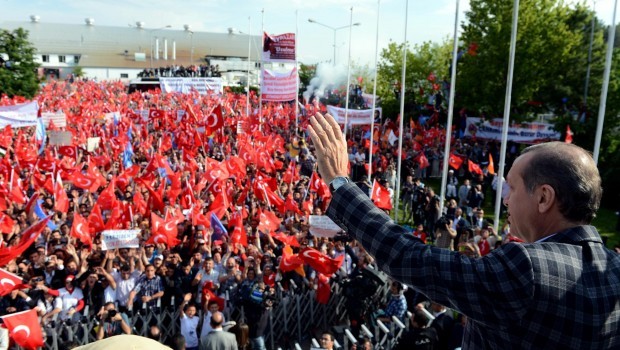It has become clear that support for the Muslim Brotherhood gives Turkey a distinct influence, which will be felt both now and in the future.
The recent local elections, in which the Justice and Development Party led by Prime Minister Recep Tayyip Erdoğan swept to victory, were considered by Turkey’s leadership as tantamount to a referendum on the prime minister’s foreign and domestic policies. Via the ballot box, Turkish voters elected not to punish Turkey’s leaders for their policies in recent years, and instead rewarded them. This happened despite the fierce campaign that targeted Erdoğan both politically and personally throughout the electoral period.
The policy of supporting the Muslim Brotherhood across the Arab world, especially in Egypt and Syria, is one of the main pillars of Erdoğan’s regional policy. Erdoğan believes that the public support he secured in the last election is an expression of firm support and a mandate and for the foundations of his regional policy. For this reason, there is nothing in domestic Turkish politics that justifies abandoning it. Instead, there is now an additional, realistic justification for extending this policy: the fact that the Muslim Brotherhood in most Arab Spring countries has been able to recover its strength and resist the pressures applied to it. The Brotherhood is a ruling force, a participant in power and a leader within the ranks of the opposition. The alliance with Brotherhood organizations in the Arab world, in Erdoğan’s estimation, has granted Turkey a distinctive influence.
Approval of Erdoğan’s policy of supporting the Brotherhood can be found in a number of Arab countries, and some Arab leaders today sympathize with the Brotherhood, Morocco and perhaps Libya being examples. Some have strategic interests in an alliance with the Brotherhood or those who support them, like Qatar. Others are forced to compete directly with the Brotherhood for survival, as the latter represents a potent force within their country’s political landscape—Jordan, Yemen, and Sudan fall into this category. Thus, abandoning a fruitful policy that serves the interest of the Turkish state at this time would, in Erdoğan’s opinion, not be a wise decision.
On another level, some feel that Erdoğan’s recent electoral victory will be reflected in two decisions regarding domestic policy. The first will be to implement further steps toward the Islamization of Turkey and Turkish society, based on the vision that Erdoğan personally espouses. The second decision relates to the possibility of Erdoğan serving a third term as prime minister, the highest executive position in the Turkish government, instead of nominating himself for the position of president, which boasts only limited executive powers. Both party and official measures will need to be taken to open the door for his continued ruling of the nation, an opportunity made possible by his recent electoral win.
Regarding the war in Syria, the biggest crisis facing the Arab world today, recent developments in Turkey have made an expanded role for Turkey, or even a direct intervention, a possible means of ending the conflict. A tactical Turkish–Qatari alliance has come into existence, with the goal of supporting armed organizations linked to the Brotherhood active in Syrian territory under the guise of supporting moderate Islam. This endeavor benefits from Western support. Thus Turkey’s policy of distributing selective support will be directed more openly and intensely, to strengthen the role and status of organizations that adhere to Brotherhood ideology, making them more acceptable on the regional and international level as a ready alternative to extremist takfirist Islamist organizations. Erdoğan succeeded in achieving this goal by increasing the popularity of Turkish policy in the Arab world, and this will result in positive payoffs for Turkey’s regional allies.
It is here that the active role Turkey played in opening a new military front in Syria must be mentioned. The northern, coastal front has held paramount strategic importance for those fighting against the Syrian regime in recent weeks. Turkey provided support to Islamist militias in their liberation of border towns and their advance to ensure an outlet to the sea for rebels close to the coast of Latakia. This may perhaps have enabled the rebels to maintain and protect access to the sea, creating a future strategic role in the victory of the Syrian revolution, with support from Turkey and its Arab allies.
In light of internal support and regional variables, Erdoğan will not find reasons convincing enough to prevent him from persisting in his policy of supporting Brotherhood organizations in the Arab world.
The counterpoint to this article can be read here.
